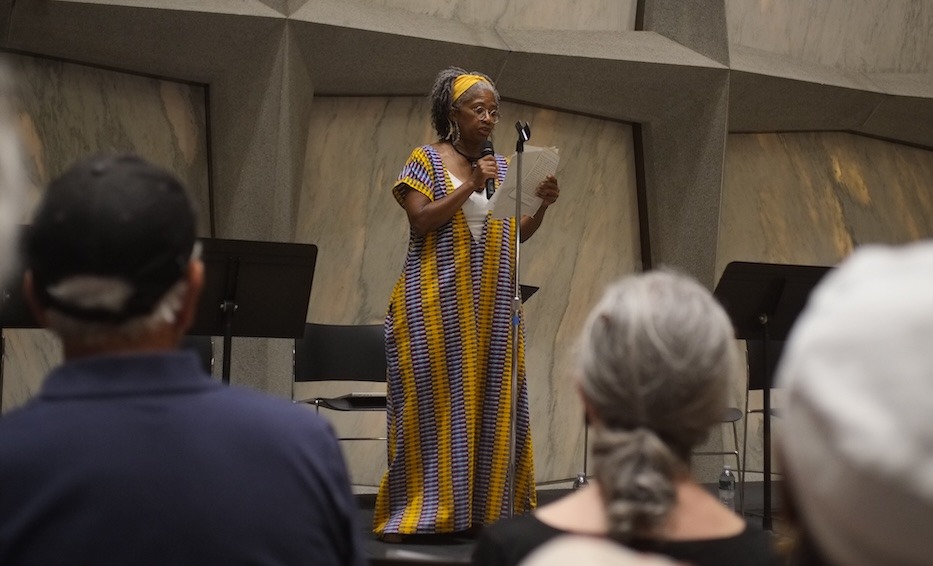
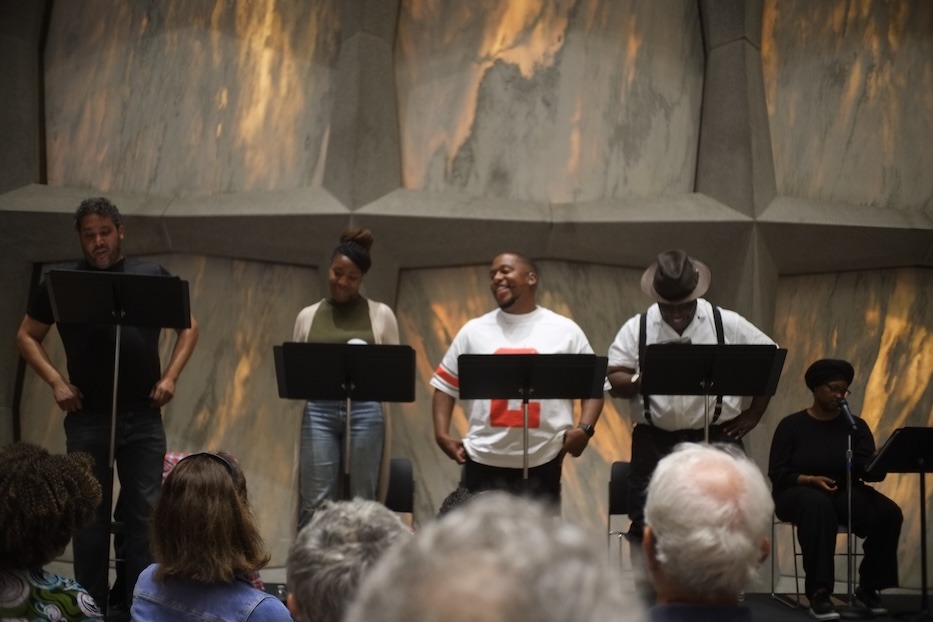
Top: Kulturally LIT's IfeMichelle Gardin. Bottom: Justin Pesce, Tamika Pettway, Stephen King, Steve Driffin and Finn Wiggins-Henry. Magda Lena Griffel Photos.
James Baldwin’s stage directions, read aloud by Finn Wiggins-Henry, set the scene. We were in a high ceilinged courtroom “emphasized by a dull, somehow ominous gold.” It was the 1950s, in a southern town known as “Plaguetown”.
To the audience gathered in the Beinecke Rare Book and Manuscript Library, this scene wasn’t hard to imagine. Through the thin marble walls, the dull golden afternoon light streamed in. The brief silence was ominous. The audience was segregated, practically sitting in the benches of that courtroom 70 years ago. Present mirrored past, reality mirrored fiction.
This was the beginning of act three of Blues for Mister Charlie, a play written by James Baldwin in 1964. In this theatrical reading, directed by Cheyenne Barboza, eight actors sat in a row, rising when it was their characters’ turn to speak. The production was a partnership between Collective Consciousness Theatre (CCT) and Kulturally LIT, two arts organizations in New Haven.
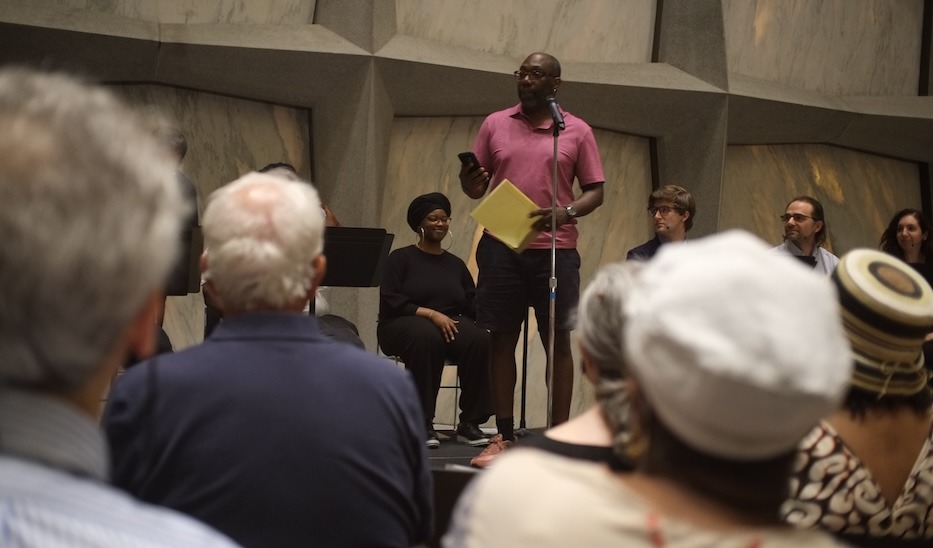
CCT Founder and Executive Artistic Director Dexter Singleton. The show is "one that is the most socially important given that it was his response to the death of Medgar Evers and Emmett Till," he said.
IfeMichelle Gardin, executive director and founder of Kulturally LIT, said that the organization’s mission “is to enhance awareness of the significance of literature of the African diaspora for everyone.” This year, the organization has been hosting “The Year of Baldwin” to celebrate what would be the writer and activist’s 100th birthday.
“For white people, I really wanted to get across the point of considering how Black people felt, or do feel sometimes, in situations when they're the only person in the room, or it's segregated,” she added of the choice to have a segregated audience for the performance.
CCT Founder and Executive Artistic Director Dexter Singleton added that he selected this play, written in 1964, because it’s “the lesser known play of Baldwin but the one that is the most socially important given that it was his response to the death of Medgar Evers and Emmett Till.”
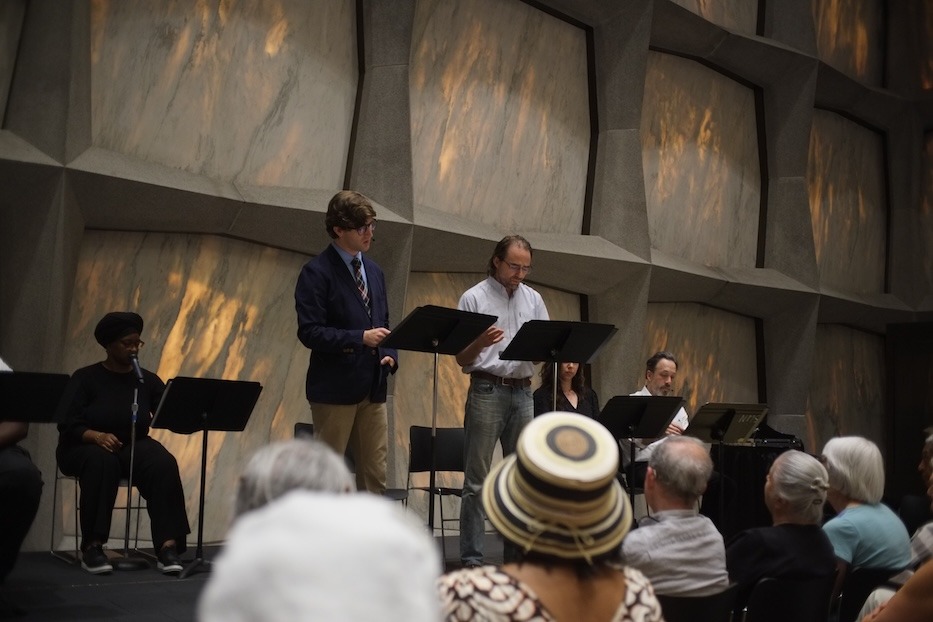
Nick Fetherston and Aaron Jafferis.
The similarities between Blues for Mister Charlie and real-life events are striking, blurring the line between what we think is fiction and what we have to face as reality. Emmett Till, a Black 14-year-old boy, was brutally killed by a group of white men in 1955. As in Blues for Mister Charlie, a white shopkeeper lied and said that the young boy sexually assaulted her, and the killers were deemed not guilty.
Almost a decade later, Medger Evers, a friend and fellow Civil Rights activist of Baldwin’s, was assassinated by a member of the KKK. In a trial in Mississippi, the all-white jury (just as in the play) let the man who killed Evers walk free. He was only convicted of murder 31 years later.
“When [Evers] died, something entered into which I cannot describe, but it was then that I resolved that nothing under heaven would prevent me from getting this play done,” reads an excerpt from Baldwin on the back of the program. “We are walking in terrible darkness here, and this is one man’s attempt to bear witness to the reality and the power of the light.”
Blues for Mister Charlie centers around the murder of Richard (played by Stephen King), a young man visiting his father’s family in the fictional southern town of “Plaguetown.” In the opening scene, he speaks to his grandmother (played by Tamika Pettway), his voice switching between tender desperation and defiance. He recalls his mother’s mysterious death years ago, explaining that he and his father Meridian (Steve Drifin) know deep down that she was murdered by a white man who never suffered any consequences.
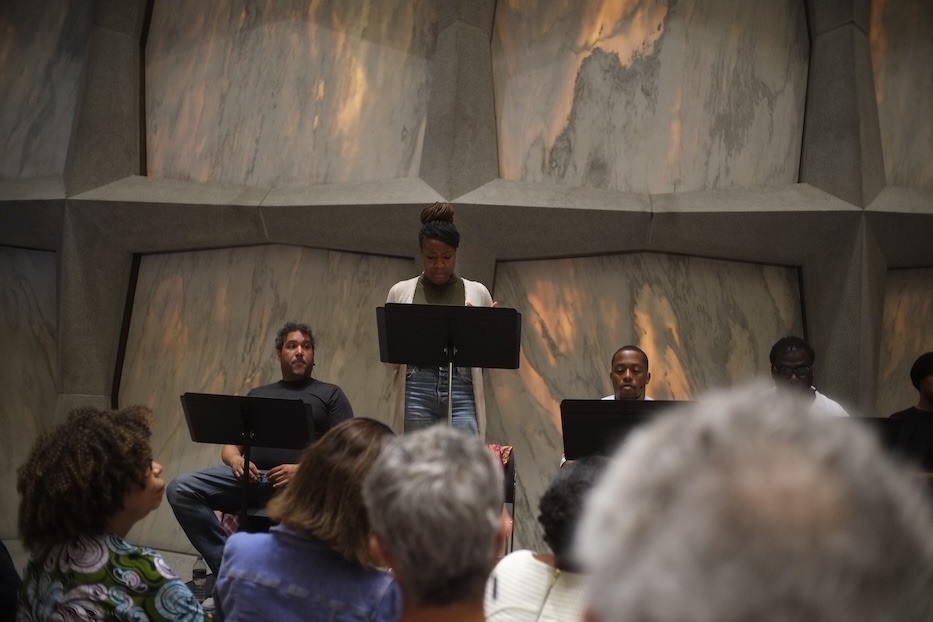
Pettway reads.
Richard wants to be the change. He wants to be the liberator. He says: “It’s because my Daddy’s got no power that my Mama’s dead. And he ain’t got no power because he’s Black. And the only way the Black man’s going to get any power is to drive all the white men into the sea.”
When he wrote this play, Gardin said, Baldwin was “enraged.” When Richard is shot by Lyle (Aaron Jafferis), a white store-owner, many characters respond with something close to indifference. The audience becomes angry too. “In Blues for Mister Charlie everybody was angry with some of the white characters,” Gardin said. For her, the question is how society responds to it. “Are you a silent person in it, or do you call them on it?”
In one scene between Meridian and Parnell (Nick Fetherston), a white friend of his, they talk across the aisle that splits the stage between the Black and white characters. Meridian is asking Parnell to ask Lyle if he murdered his son. Parnell will not; he refuses to betray Lyle. In his suit and tie, he bows his head as he reads, shrinks a little. Meridian stays firm, disappointed “I don’t want you to do it for me. I want you to do it for you.”

Steve Driffin as Meridian.
Blues for Mister Charlie weaves back and forth to the days before and after Richard’s killing. As past and present are separated by mere seconds, the audience catches glimpses of the character’s memories. We learn of Lyle’s other crimes, of Parnell’s memories of a young Black woman he loved, of Jo’s (Lisa DeAngelis) suspicions of her husband Lyle. We learn of Juanita (also played by Pettway), who sees Richard’s humanity and hopes she is pregnant with his child pledging, “I’m going to raise my baby to be a man.”
As the play closes, Lyle walks free. The audience is left with a question: how much has really changed? Baldwin’s works are often called timeless American pieces. Past and present can blur.
“The themes, the voices and the opinions in the play resonate still, 50 years later,” Gardin said in an interview after the show. “It's kind of sad. People have not evolved with the time.”
Gardin described this current political time as counter productive. She referred specifically to Project 2025, a right-wing, conservative initiative aiming to reshape the federal government. “It’s trying to abolish everything we’ve worked for. The equality.”
In a scene before we enter the courtroom, Meridian (Drifin) stands in the church, giving a sermon. “It is not the past which makes our hearts so heavy. It is the present.”
Meridian gazes up at the sky, lifts his hands. “Lord, where is our hope? Who, or what, shall touch the hearts of this headlong and unthinking people and turn them back from destruction?”
His son has been murdered, he is desperate. “Lord, what of the children?” he pleads. “Let not our suffering endure forever. Teach us to trust the great gift of life and learn to love one another and dare to walk the earth like men. Amen”
Softly, but unanimously, the audience echoed him. “Amen."
This article comes from the 2024 Cohort of the Youth Arts Journalism Initiative. Magda Lena Griffel is a recent graduate of Wilbur Cross High School, where she edited the school newspaper, and is headed to Columbia University in the fall. For other "Year of Baldwin" events from Kulturally LIT, click here.